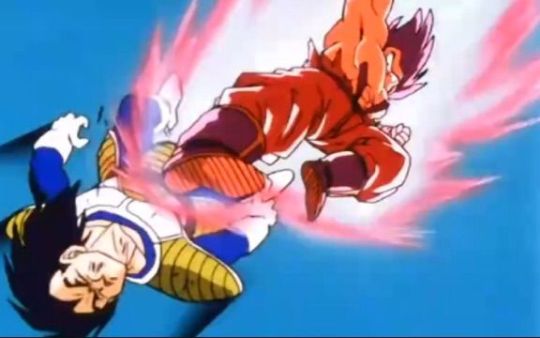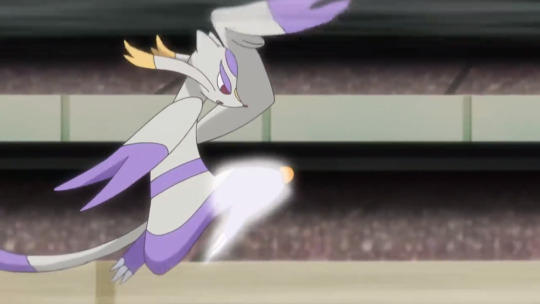Text
Another randomly selected Pokémon:
Fletchinder

Starting with the name, it's ヒノヤコマ, Hinoyakoma, a combination of 火の粉(ひのこ,hinoko), sparks, and 駒鳥(こまどり,komadori), the name of the japanese robin it seems inspired from.
As for its abilities, this time both of them have a Japanese name, even if they are both pretty literal translations.
Flame Body is called 炎の体(ほのおのからだ,honoo no karada), while Gale Wings is called 疾風の翼(はやてのつばさ,hayate no tsubasa).
Let's look at a Pokedex entry, there's a lot of cool examples of "different Dex entries say the same thing in slightly different ways" for this Pokémon!
火の粉を クチバシから 飛ばして 草むらを 焦がし 驚いて 飛び出した 獲物を 捕まえる。
This sentence is a good example of how I approach and try to break down a bit more elaborate sentence if I don't get it immediately. I first look at verb and を particle.
獲物を捕まえる
獲物(えもの,emono) "prey" is a word we are going to see many, MANY times in Pokédex descriptions.
So this sentence is simply telling us "it catches prey". Everything else that comes before is a description on how this happens.
火の粉を クチバシから 飛ばして
飛ばす(とばす,tobasu) "To let fly/To launch/Spit out"
嘴(くちばし,kuchibashi) "Beak"
"It spits out sparks from his beak (...and does the following action)"
草むらを 焦がし 驚いて 飛び出した 獲物を 捕まえる。
焦がす(こがす,kogasu) "To burn"
"It burns grassy fields , then catches surprised prey that jumps out"
So the whole Dex entry is saying something along the lines of:
"It spits out sparks from his beak and burns grass fields to catch the prey that jumps out in surprise"
Other dex entries retell the same thing reorganizing the sentences, so we can kind of use them as confirmation that we have understood the sentence (and practice the vocabulary)
草むらに 火の粉を まき散らす。
This sentence is pretty much the same thing just with a slightly different verb.
まき散らす(まきちらす,makichirasu) "To scatter, to spread"
Interesting moves it can learn:
追い風(おいかぜ,oikaze) Tailwind
It translates pretty directly, and it also has the same meaning of "favourable conditions" that the word or similar have in many other languages.
燕返し(つばめがえし,Tsubamegaeshi) Aerial Ace
It literally translates to "Swallow return" and it's based on a sword technique with a similar name, which is in turn inspired by "the movements of a swallow's tail in flight". It was developed by Sasaki Kojirō, who was a heavily respected (and feared) swordsman in feudal Japan. His technique was apparently blinding fast, and involved a fierce downward cut followed immediately by one upwards.
He is regarded as one of "History's greatest losers", as he was killed in a legendary duel by samurai Miyamoto Musashi, who described him as "the strongest opponent he had ever faced".
These two guys appear a lot in various Japanese media. They appear as central characters in the historical manga Vagabond...

And get referenced everywhere, from One Piece, to the Dark Souls series that references Kojirō's legendary sword, to Fate(then again , name someone who is not in Fate) to Pokémon itself, again.
Which characters are named after them, you ask?

Yep.
#learning japanese#japanese vocabulary#japanese langblr#japanese language#pkmn#pkmn trivia#pokemon#pokémon#fletchinder#language learning#japanese learning#japanese#neko's vocabdex#jessie pokemon#james pokemon
7 notes
·
View notes
Note
this blog is delightful, i love that your first post was about skitty and i very much look forward to your future posts :]
Thank you so much!!
As I said, it's probably my favourite Pokemon, with a surprising amount of little trivia and curiosities tied to it.
I was thinking of opening up asks if people want to request a specific Pokémon, since the objective is pretty much to cover them all, long term.
1 note
·
View note
Text
I used the random Pokémon generator to get me a Pokémon to look up, and the result was
Medicham
The Japanese name doesn't have any actual references to the Japanese language, so we're going to skip it.
(It references pants, look it up)
For it's two abilities, Telepathy gets simply translated, while Pure Power is... Actually "Yoga Power". So that's why it's a signature ability of Meditite and Medicham.
Now let's look at a Pokedex entry:
ダンスの ような 優雅な 動きで 攻撃を かわして 強烈な 一撃を 相手に お見舞いする。
Let's divide this sentence in various parts:
ダンスの ような 優雅な 動きで 攻撃を かわして
ような before a noun indicates that the noun is similar to something else, or like something else.
Then we have 優雅 (ゆうが,yuuga), graceful, acting as a なadjective before the noun 動き(うごき,ugoki), movement.
Finally we have 攻撃(こうげき,kougeki)をかわして, "to dodge an attack (and proceed to do something else with the next sentence, signaled by て)".
"With dance-like, elegant movements, it dodges attacks"
強烈な 一撃を 相手に お見舞いする
This sentence is pretty straightforward.
強烈(きょうれつ,kyouretsu, strong), acts as adjective to 一撃(いちげき,ichigeki, strike, implied to be a singular attack).
The verb used can seem a little strange on the other hand.
If you look up お見舞い(おみまい, omimai) in the dictionary, you will most probably find that is has the meaning of "paying a visit to someone who's ill", even having the honorific お in front of it which implies that the whole word gets a sense of "respect" to it, something to not be treated lightly.
... Which doesn't really make sense in this contest.
But if instead of looking up the noun+する form we look at the verb 見舞う without honorific, it does also have the meaning of "to hit or strike", which makes sense in this contest.
(After having dodged attacks) "It strikes the opponent with a single strong blow".
So in this case we are using the polite form of 見舞う and it becomes お見舞いする to give it a more "official" sound, like a pokedex entry would.
Interesting moves it can learn:
飛び膝蹴り(とびひざげり,Tobihizageri) High jump kick
Maybe it's unoffical signature move... Or at least the one I always hoped it would use against me and fail.
When I was a kid, it always struck me as weird that you would damage yourself if the move failed. You are jumping and hitting the enemy from the top, if you miss don't you just... Land back on the ground?

Pretty much what I was picturing every time.
The reason is that the literal name is "Flying knee strike", which implies that you are trying to hit the enemy with your knee.
So of course if you miss, your Pokémon is going to bust that kneecap straight on the ground.
No wonder it hurts so much.
The anime thankfully made it much more clear.

発勁(はっけい, Hakkei) Force Palm
"Hakkei" is a martial arts term that comes from Chinese, and describes "releasing internal power explosively".
This is a purely physical action: it's a set of methods to move your body in such a way to generate a lot of force in small movements. One example made famous by Bruce Lee is the "one inch punch".
発 is a kanji that gets used in so much vocabulary it's good to learn it early.

#learning japanese#japanese vocabulary#learn japanese#pokémon#pokemon#medichamp#neko's vocabdex#japanese language#japanese langblr#langblr#pkmn trivia#pkmn#japanese learning#japanese#language learning
8 notes
·
View notes
Text
The first Pokémon to examine couldn't really be anything else except one of my favourites:
Skitty
Big disclaimer: I'm still learning myself. This blog is an attempt to learn something new for myself first. If anyone notices any kind of error in what's written here, even just a spelling typo, please let me know!
Learning is what we are all here for after all.
First, let's start with the Japanese name
エネコ Eneko is a pun between 狗尾草 エノコログサ Enokorogusa, which refers to the green foxtail, the type of plant that Skitty's tail looks like, and 猫 ねこ neko, cat.
Then let's look at some of the Pokedex entries:
動くものを 見つけると 夢中に なって 追いかけ回す 習性を 持つ ポケモン。
夢中(むちゅう) being absorbed in something
追いかけ回す(おいかけまわす) to chase something around
"When it sees something that moves, this Pokémon has the habit of getting immersed chasing it around"
You can attach 回す to the -masu stem of a verb to indicate that you are doing that action "all around, all over"
(Example: chasing around)
動くものを つい 追ってしまう。
"It ends up chasing moving things unintentionally"
Different dex entry, same general meaning but with a slightly different nuance. I find reading these kind of dex entries useful because they offer multiple ways of saying the same thing, and are good to reinforce the same vocabulary that appears in them and grammar rules.
ーてしまう signals that you are doing the action without meaning to
つい as an adverb similarly shows that you are doing the action unintentionally, subconsciously, and it's often paired with てしまう to emphasize it.
For its abilities, they are mostly named with English words anyway even in Japanese, except for Cute Charm (which was its only ability in Gen 3, if I remember correctly, since Normalize didn't exist)
Cute Charm is called メロメロボディ, which uses the "meromero" onomatopoeia to indicate being spellbound or madly in love.
Some interesting moves it can learn:
猫騙し (ねこだまし, Nekodamashi) Fakeout
The Fakeout move has a interesting bit of trivia in its Japanese name! It has the kanji for "cat" and "to deceive" in it, and it's actually a reference to a specific sumo move!
"Nekodamashi" refers to a sumo technique where one of the athletes slaps the air with both hands right at the beginning of the match near their opponents face to stun them. That's why it can only be used in the first turn in the Pokémon games!

And since it translates pretty much to "cat's deception", it's the reason why mostly kitty Pokémon other than Fighting types like Hariyama can use it.
真似っこ (まねっこ, Manekko) Copycat
It stands for "to imitate" and I can't help but think that the reason it can learn this move is because of another cat pun in "manekko", which conveniently also works in the english version. Sadly not in other languages.
Skitty's lost signature move:
猫の手 (ねこのて, Nekonote) Assist
Another cute move with its origin stemming from a Japanese idiom!
Assist is another move that can be learned almost exclusively by cat Pokemon, and it's effect was to randomly use a move known by another Pokémon in the party. It was unique to Skitty in Gen III and is what made it maybe my favourite Pokémon ever: watching this adorable pink kitty bust out Earthquakes and Flamethrowers that the rest of my team used was hilarious. Was it effective? Usually not, but it was hilarious.
I always had a Skitty on my team during most of my Gen III playthroughs and in ORAS.
The idiom is 猫の手も借りたい ("I want to borrow even a cat's paw), which is a way of saying "I'm desperate and need any help I can get ". Even a cat's.
Cute and fitting name for a move where a kitty asks the rest of his team for "help"!

#pokémon#japanese#japanese langblr#japanese language#pkmn#pkmn trivia#nihongo#japanese learning#skitty#pokemon#langblr#neko's vocabdex#learning japanese
67 notes
·
View notes